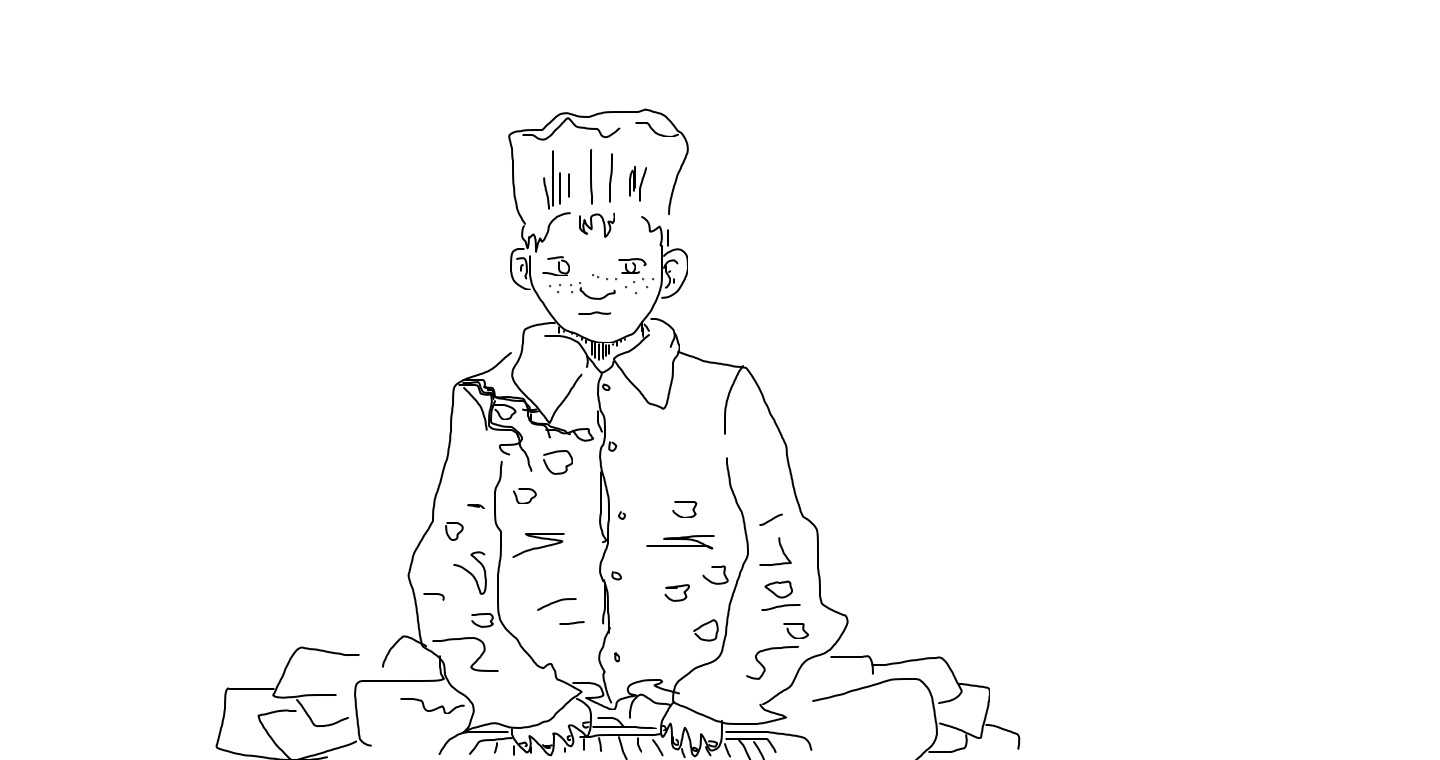
Ymañn Ulwen
sex: male
occupation: [Taboo Preserver]
blood type: AB
theme song: Burach - Born Tired
likes: free time, bristly fur, grid layouts, musical improvisation, imaginary numbers, lavender tea, unconscious magic, cinnamon, chess
dislikes: arguments, repetitive magic, long proofs, tomatoes
seen with: dogs
Theme song: Burach - Born Tired
The third [Taboo Preserver], YMANN ULWEN was a popular streamer (improvised music and experimental magic) before retreating from the world to become take on his role. His streaming career, which began at age 13, ended in an acrimonious feud with another streamer, an older woman named Kruhai Shelsynn. The details of this feud have been erased from all networks, including ecclesiastical & military, in exchange for Ulwen’s co-operation. Ulwen’s sleep and psychological magic compatibility scored third highest in a gauntlet of tests conducted in 4151 AH, two years before the reincarnation of the Dark Lord, breaking all previous records including those of previous [Taboo Preservers]. Ulwen said the following explaining, in an unscheduled interview, why he wanted to take on the sacred role:
“I mean I want to say it’s out of duty to civilization, and I also know the rumours that I’m not supposed to say duty, that candidates who say duty are rejected - I won’t get disqualified if I admit to knowing about those right? Everybody knows them. So you can doubt my honesty in either direction. But it’s really not about duty first, or maybe that’s what I think about first but not what I feel first. I’m turning 18, and people tell me I don’t know what I want to do with my life, but I think I do. I’m told I have potential in the Magic Academy, but I don’t think I’ll accomplish anything great. I don’t think I’d be able to handle accomplishing anything great, and if I got close to accomplishing something great I think it’d slip away from me. Of course, I don’t have to, but on the other hand, looking out at another sixty years or something, and it seems like too much work, an unbearable amount of work, not to accomplish anything great. Not just the work work, most of that I’d probably be OK with if I got a job where I’m able to decide what I’m doing, but the people work, the expectation work, the letters, the conventions, the academic feuds…
The recruitment letter warned about aging rapidly, but I feel like I’ve already aged prematurely, when I talk like this. I need to say that because in a person my age everything I’m saying probably sounds like depression, which I’m sure is a red flag for you. But I’m not sad, I’m not even not feeling anything, I feel full and at peace and wistful and terribly afraid something’s going to shatter it all. I understand that something could shatter it in this position - if things go wrong - but that would mean something, and I really believe I could face it with dignity, if everything else was right with me and around me. I don’t want to be disturbed, but I don’t think I’m a coward; I want to keep playing, but I don’t think I’m childish. When I’m just playing around with things, I feel close to the Goddess. The Goddess is perfect order, and I feel her, right there in me. I know that’s weird to say as a man. I understand you haven’t had a male [Taboo Preserver] before? Whenever I have to reach out into the outside world, to express any of that, I feel chaos. The serpent-God. And I’m not interested in chaos. It’s also in me, and it creeps up on me and tries to devour me every time I’m not thinking about something. I just want to think about things, and not chaos kinds of things, not me kinds of things. I want Her. I want to devote my whole life to Her, as she appears in me. It’s a little embarrassing to say but I want the comfort you’re offering too. And I can’t see any kind of life that lets me do that the way this does. It doesn’t bother me that I’ll be asleep. I’m with Her when I’m asleep. She is the spine of my dreams. I’m content to climb up and down that spine, forever.”
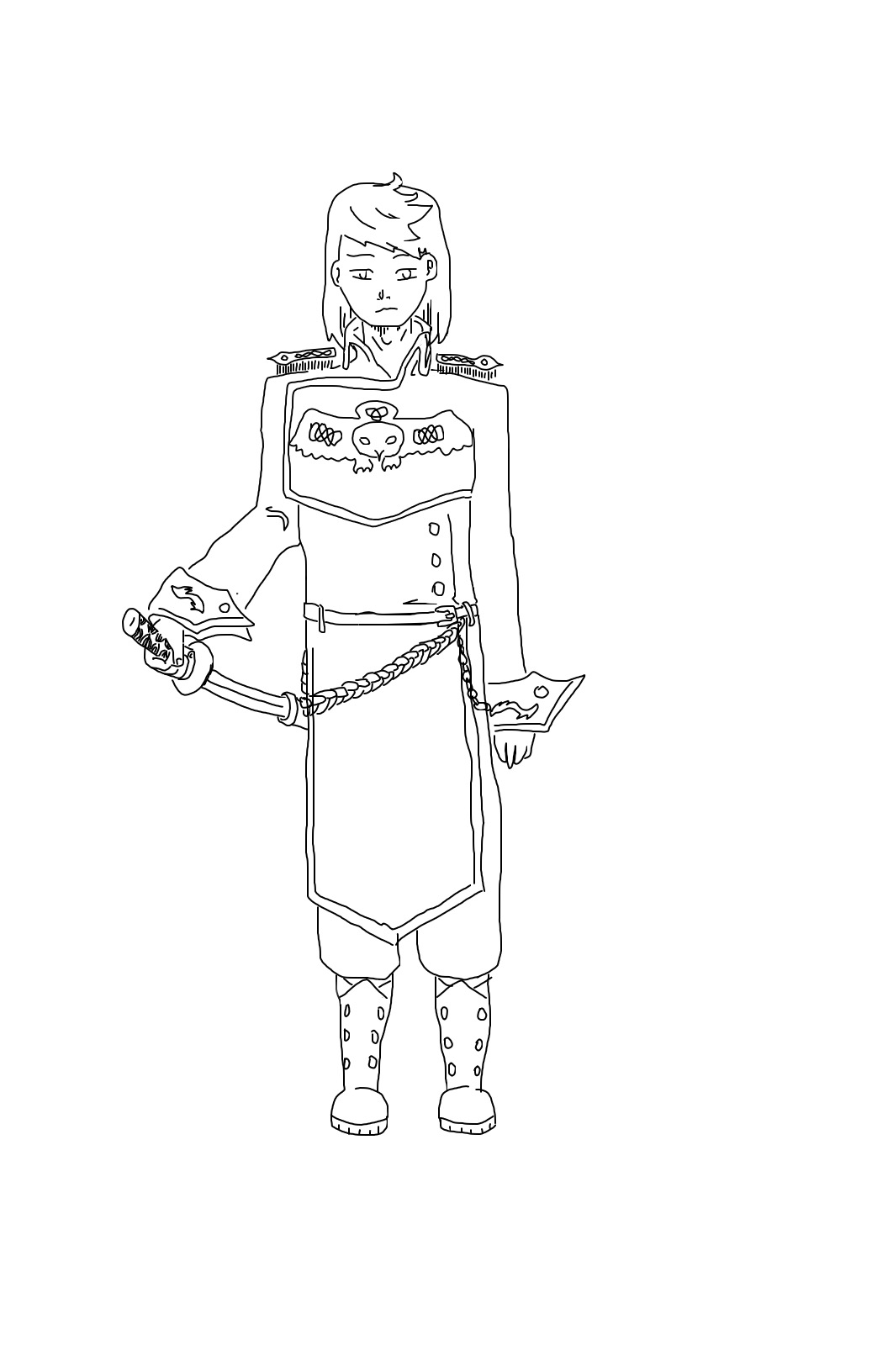
Rraihha Braz
sex: female
birthday: 8 August
occupation: Commissioner
blood type: A
theme song: Figgy Duff - Weather Out The Storm
likes: flower smells, big windows, mystery novels, trains, places where no one knows her rank
dislikes: waiting rooms, civilian politicians, internet culture, uneducated opinions, male sexual display
seen with: Ymañn Ulwenn, General Shaïgnar, government officials
Commissioner Rraihha Braz is one of the last major aristocrats of Elthazan (her family holds the title of Marquis to a strategically significant mountain region, though she was not directly in line for the position) not to have dissipated their financial and political fortunes in the new opportunities for indulgence and pleasure offered by the long post-war era. To be clear, she is not a reactionary or power-hungry. She has passed tests of loyalty to the Ecclesia and global constitution specially designed not only for aristocrats but for aristocrats like her - aristocrats with the potential to become warlords. She passes them out of genuine belief, not awareness of her best interest. Her loyalty to the modern regime is cut of the pure, dumb, chivalrous cloth as in aristocrat’s loyalty to the aristocracy three centuries ago. She expresses her noblesse oblige through meritocracy.
Beneath all the purity of intention lies a deep fear of being humiliated by this era. Such a fear would naturally prevent her, like others of her birth, from resting her self-esteem on withered laurels. Instead she proven herself extensively through education, studying strategy to the third degree of initiation, theology to the fifth and history to the sixth, as well as passing twelve standardized combat exams. In none of these fields (except perhaps her exceptional physical constitution) is she a genius - simply a dedicated worker and a scholarly temperament, who continues to dedicate much of her free time to reading and study long after having achieved all relevant credentials. Despite this, her rapid promotion through the ranks of the Elthazan military, which values seniority and “real” military experience (this largely means performance in wargames, and effectively, more seniority and nepotism), even in a time of peace, over book learning and even combat skills would not have happened if not for her name, as a token of the military’s continuing alliance with the aristocracy. On some level, we believe she knows this, and simply compensates for the artificiality of her position by being as genuine in everything she does as possible. She excels at living up to all sorts of expectations, but would be just as humiliated by admitting that she is doing so, so she finds reasons in themselves to meet them.
All of these complexes made her an exceptional candidate for Commissioner - the military of Elthazan’s primary oversight in the extremely delicate and risky operation the Ecclesia and Human Defense Alliance are currently running inside their borders. Despite concerns that she might be too sincere for psychological operations, she learned the principles of containment quickly, and the inverse of her sense of noblesse oblige is a barely-concealed disdain for the less exhaustively self-realized (the Dark Lord most of all) that combined with her extensive historical knowledge has produced a ruthless and intuitive manipulator. She has become something of a protege of the visionary General Shaïgnar of the Human Defense Alliance, Martolod’s hand-picked successor, and has been an especially stabilizing presence for the [Taboo Preserver], whose preference for being alone was shading worryingly into loneliness in several psychological evaluations before Braz’s appointment. Recently we have approved forms of intimacy between them that have been historically unusual for [Taboo Preservers]. The exception may be more dangerous for Braz, whose own social life has been almost entirely official for several years, than for Ymañn, but she has not indicated any dissatisfaction, and we hope they will see in each other a model of dedication.

Llau de Xiau
(ʎaʊ də zjo) can also be pronounced like ʝ̞aʊ də zjo
sex: male
birthday: July 18
occupation: NEET
blood type: B Negative
Theme song: The New York Electric Piano - Temple Dog
likes: Gentle Highland Ranger Patrol Lucielle, spectating on internet arguments, parasocial intimacy, ruining other people’s childhoods, reliving his, growing up by layering meaning, undetectable cough syrup abuse, doujin music, long walks in the suburbs, snow
dislikes: narrow sentimental forms of nostalgia, commercialized otaku influencers, NTR, action series, forced animation
seen with: parents
FEED
Whimsical Ero Pedlar
@Suburbophile
I love fucking mons, uhhh I mean, I fucking love mons! stack enough layers of irony and you will uncover the secrets of the universe
891 following__________45 followers
@moephrenology Happy 21st unban! (Yes I’ve been keeping count)
@moephrenology idk I think you can be transmasc and a maid and I’d have the pics to prove it if Sketch Party fucking autosaved (do you wanna play Sketch Party sometime?)
@moephrenology onii-dude you were in the range of that blackout were you alright?
@lolarbitrary omg I’m so jealous I wanna eat seafood sweets like Selchia some day TT…. maybe next trip
@railroadspikehead come on man idgi still but I’m sorry
railroadspikehead sorry
@railroadspikehead yeah I know you’re in a Theology program and I’m not. but the censors cleared this and they have like super Theology degrees so maybe we can both defer to them at least putting it in the space for public discussion? idk why you’re being so pissy about this
@railroadspikehead no I think when you anthropomorphize a spiritual concept you add another layer of meaning to it, even if it’s silly or stupid - in the same way irony is a layer of meaning. I know another poster who can explain this better but he told me to stop tagging him in arguments
@moephrenology trad Silmenonian priest to wife
Happy birthday Syucha, the cutest eldritch sex demon hidden in plain sight in a kids’ show! reuploading the legendary conspiracy infographic
@Suburbophile liked a video on Panopticon: Lylyria - Umbilical Rose [Decensored Transformation MAD]
@Suburbophile tagged @moephrenology in a quiz on Quizzoo - How Would You Die In Anime?
@Suburbophile tagged @moephrenology in a quiz on Quizzoo - Which Decade of Memes Are You?
@Suburbophile tagged @lolarbitrary in a quiz on Quizzoo - Which Decade of Memes Are You?
@Suburbophile completed a quiz on Quizzoo - Which Decade of Memes Are You?
I really appreciate @lolarbitrary’s posting bc he can take “blah blah I don’t know what to post” and make it hilarious somehow. of course I also appreciate people who just don’t post until they have something to say like @moephrenology or @railroadspikehead
blah blah I don’t know what to post. hiiii [waving puppy gif]
rare live action promotional music video from Super Wolf Pups: God Will Fail Even You Beautiful Creatures. found on my childhood hard drive my dad was about to throw out | wow this is blowing up but who am I kidding no one’s gonna follow me from it
@moephrenology does the Train Troopers Armoured Kiss reboot look so bad it’s good or so-normie-good-it’s-bad. need your input on this
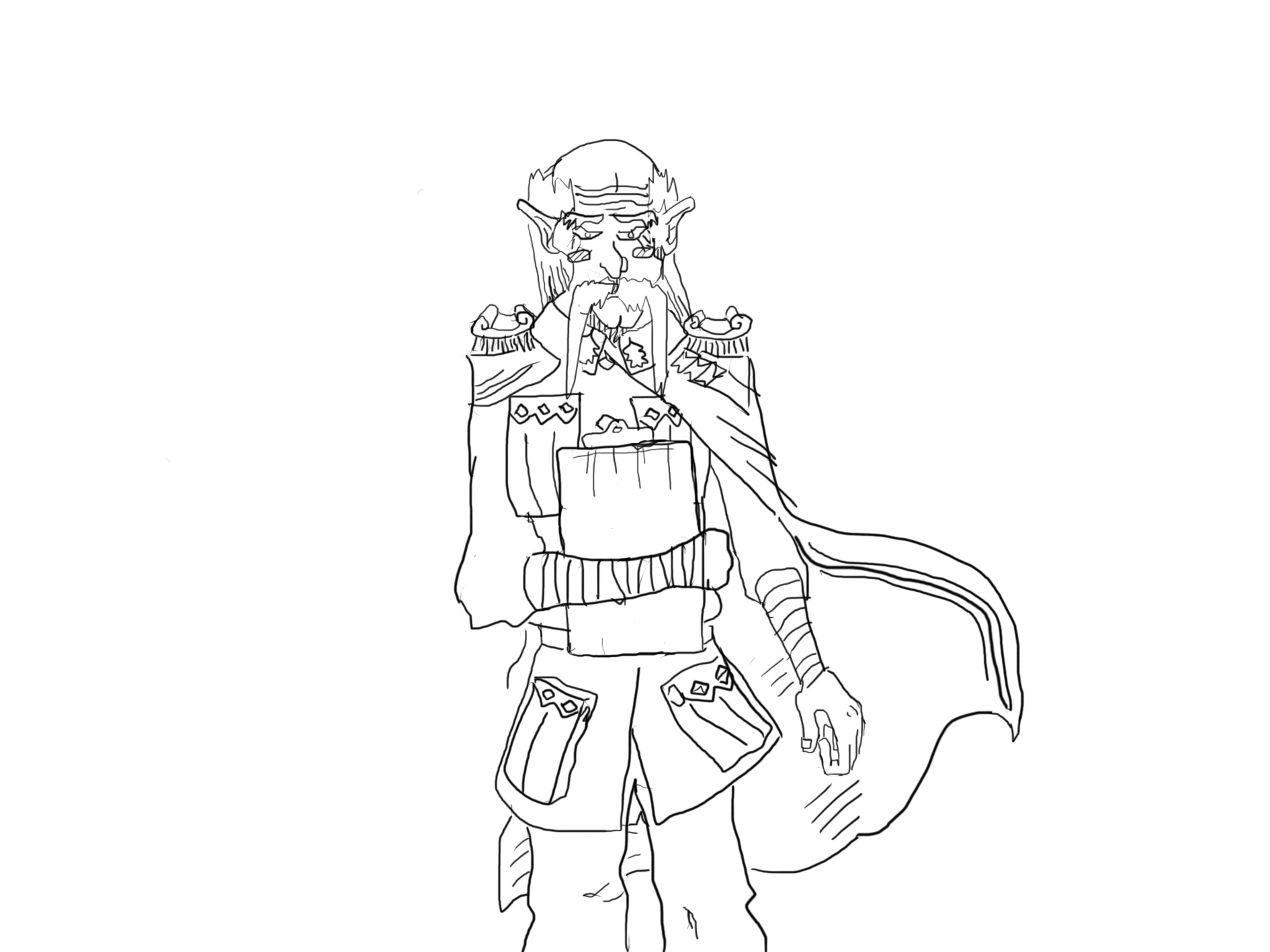
Ramaña Shaïgnar
sex: male
occupation: general
blood type: O
likes: caramel coffee, space folding puzzles, feats of magical engineering, singing over drinks, wood fire, the smell of decomposition, late autumn, the Druidic classics, fairytales, children’s illustration, stories about other people’s kids, dirty jokes, the human soul
dislikes: good enough, using magic when you don’t need to, consumer culture, inherited status, nosy civilian authorities, dating, cynical genius characters in fiction, soldiers who enjoy killing
seen with: unknown
theme song: Blackbraid - Prying Open the Jaws of Eternity
It is hard for most people high enough in the security apparatus of the Pious Alliance of Humanity to know him to believe that Ramagna Shaïgnar was not born prematurely old and pessimistic, a sort of security program who exists to run worst-case scenarios on reality. preserver record If not that, one assumes some trauma must have made him that way. And very few are entrusted with any details of his life outside of military affairs to suggest otherwise. Rraihha Braz happens to be one of those few.
Ramaña Shaïgnar was a well-adjusted, happy, creative child, and this child persists somewhere inside him - “a single white feather/at the heart of a vast machine of black iron/built to protect it”, in the words of one of his pseudonymously published poems. He did grow up in the security-conscious atmosphere of a traditional reserve town near the Dark Marches, where minor monsters like slimes, chupacabras and bargelds regularly (his only column in a mainstream publication is a formative memory, which he told so many recruits they begged him to write it down, about a Hellfire Centipede that got into his room). But it was assumed by his childhood friends and classmates that he would grow up to be a writer. He attended a high school offered by the local Alliance base where he learned strategy at a young age, but at fifteen was captivated more than any literature he had ever read (in an admittedly limited environment) by the oral poetry of a Druid caravan that was visiting the school and ran away to join them.
Almost thirty years later, Ramaña Shaïgnar resurfaced in the recruitment rolls at a military academy in Kamann near the border of Zorrh. The Druid order he left has said little about the circumstances of the rare defection except to clarify that he would never be allowed to return. In the academy he specialized in a branch of abstruse mathematized strategy whose brief popularity was already on the wane due to tensions between the Ecclesia and the Alliance. (His improvised magic, especially in combat, is also considered on par with professional demonstration artists.) He allayed suspicions about his beliefs and loyalties by being explicit about his loyalty to Druidic culture, while arguing lucidly that the prohibition on human use of magic enforced by the order was no longer tenable, and that elements of Druidic ethics had to be integrated into orthodox theology and magical security. His evident brilliance stymied anyone who might have hindered his advance through the ranks over his unorthodox ideas, but no one seems to understand how exactly he got high enough to be involved in the containment of the Dark Lord while being so widely disliked. Yet no one can dispense with him either. Half a dozen of the most successful anti-Dark terror campaigns of the last decade were conducted under his command, across a staggering range of varying strategic terrain.
The “feather” at the centre of Shaïgnar’s “machine” is his childhood. Ironically, as a child, his rarely completed writings focused on the construction of elaborate worlds and systems. As an aging (gracefully, despite his height and hairstyle - he has an unwanted fandom among uniform chasers) man, his hastily completed writing (too rarely revised or even revisited to achieve any major aesthetic success) is small and sentimental in scope, with the exception of internal allegories like “The Feather and the Engine”. Nothing in his mature life approximates the amber-preserved everyday he has devoted his life to protecting both in his own heart and the security landscape. His only friends are those few colleagues he respects, like Rraihha Braz, who on his rare vacation days he will sometimes rope into a weekend of manic drinking only to return to distant professionalism at the next meeting. As a holdover from his Druidic practice, he has also throughout his life kept a number of animal companions - currently a goat, a wolf and a nighthawk (which often nests inside his coat on official business) - though they do not appear to do magic or speak to him.
The Ecclesia has an entire team dedicated to monitoring him for heresy, but they admit that if he in fact did have heretical sympathies, they probably wouldn’t know.
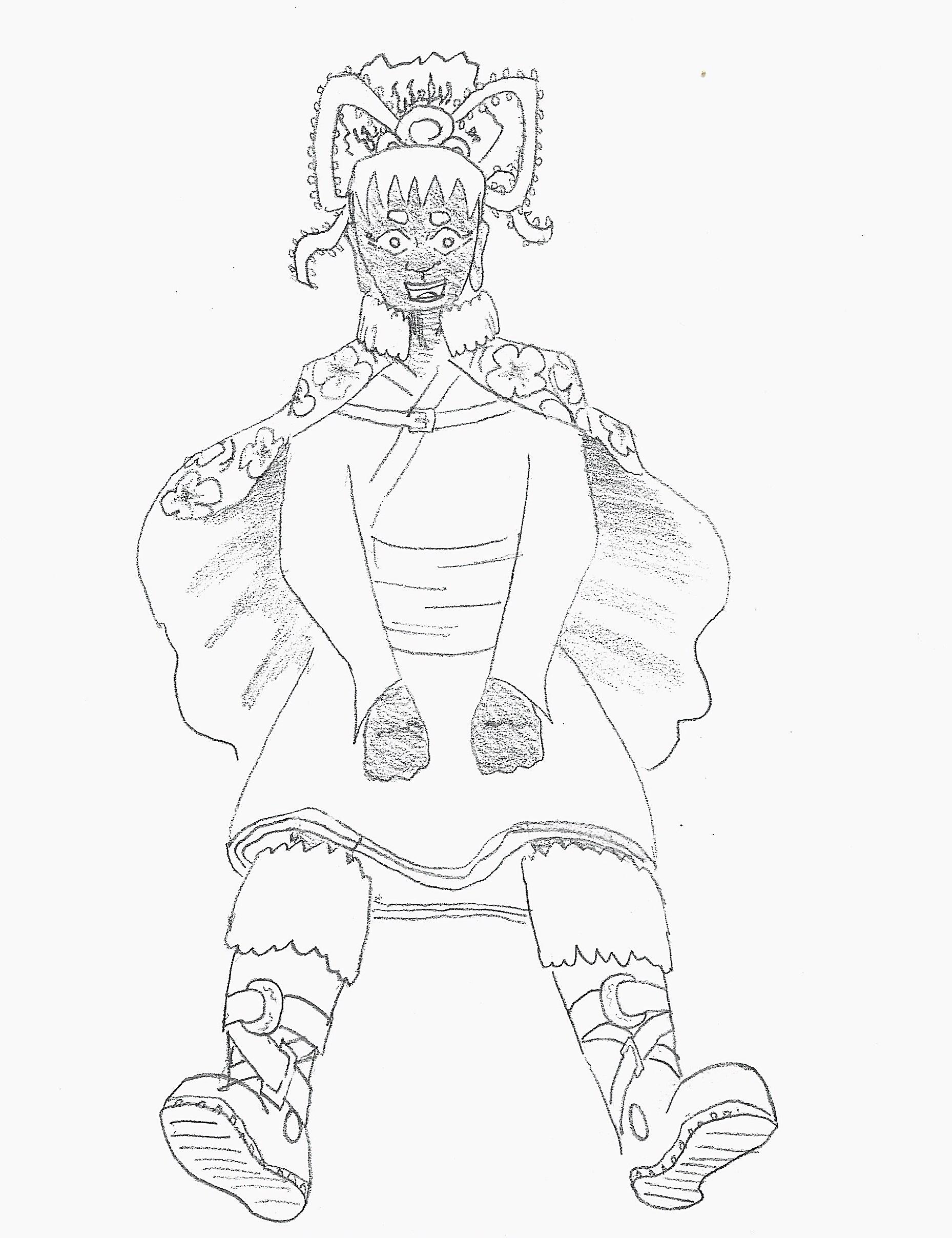
Marzanna Etnexheyr
Sex: female
Occupation: journalist
blood type: A
likes: weird people, serendipitous encounters, convenience store food, window shopping, old Miwa sutras, tall girls, impressing people who think she’s an idiot
dislikes: journalistic cliche, popular religious enthusiasm, snobbery, liquor so hard you can’t taste it, heavy Elthazan food
Theme song: Rush - The Pass
Most people who graduate from Yn Dahh’t, one of the proudest collaborations of historical more-than-friends Klauxion and Miwa, become the journalistic equivalent of super spies. In fact super spies don’t really exist under the Pious Alliance of Humanity; Yn Dahh’t journalists are maybe the closest thing there is. Its alumni investigate Dark rings and shapeshifter outbreaks, emerging cults and heresies, corporate malfeasance, government and Ecclesia factions seeking the drop on each other. There is technically a culture stream but Marzanna double majored in the investigative stream for the career opportunities, plus an extra course of monastic arts every year “just for fitness” (she genuinely enjoys the practice), and it was the clearance she got fresh out of school in Winter City that came with the instructions on how to receive and follow coded messages from an Ecclesiastical branch that as far as she knew, before and after clearance, didn’t exist.
So how did someone like this get to the point of being interested in a “story” like Luskonneg?
Marzanna was flagged by a spiritual counsellor for being hypersexual as a child (sending imitations of adult cards to her classmates and threatening to pee on her enemies). Her frightened parents - lay members of a patrilineal Miwa cult that had floated on the edge of heretical anathema, stuck in the bureaucratic process, for half a century - enrolled her in martial arts training. The problem itself was resolved quickly, but turned out to be the tip of an iceberg of a guileless, naive frankness that dangerously dominated her personality - including aggression. Martial arts, however, proved to be the most exciting thing in her life so far, and to keep practicing she enrolled in Yn Dahh’t. A full-time monastery, or competitive pankration, would have been too austere for her - the problem was she didn’t like journalism all that much either. Controlling her impulses (particularly sexual - she followed the Monastery’s mostly nominal rule against dating to the letter) by becoming relatively withdrawn, she nonetheless succeeded academically enough to prevent this fact from sinking in.
Being flagged over something so vulnerable at such a young age made her wary of confiding too much in spiritual counsellors, and she turned to another place to help understand herself: Punkin Patch. Her natural personality came out in her posts and no one judged her for it. The stereotype of a Punkin Patch user is someone desperately trying to ignore the failure of their own life or social skills by gawking at people who have it worse than they do, and to an extent this was true for her, but she thought of it more as a process of trying to understand people like herself, and when she put it that way in a post even she knew was risky almost no one objected. (A modified form of the post still circulates as the copypasta “Scarecrows [slang term for Punkin Patch users] Have Hearts Too”.) At some point it struck her that if she could get anything out of the kind of investigation she was learning at Yn Dahh’t, it was whatever she was getting out of Punkin. She specialized into the culture stream, and her graduating project was unorthodox and controversial but one of the most praised in her year - a front secret-sharing network who were then approached to share their stories under each other’s names, merged into a common narrative of events in the school, including several involving people not explicitly part of the experiment. One professor suggested she become a novelist, but though the Each Other Project was elaborately literary in structure, she does not consider herself creative enough.
Since graduation, she has not figured out a way to replicate the Each Other Project’s success (and has resisted on principle the proposal of several publications to simply repeat it in an adult setting). This means that after almost 5 years, she has not even started a Journeyman’s Project - the cornerstone of her permanent license - and is nearing the end of her Establishing Grant.
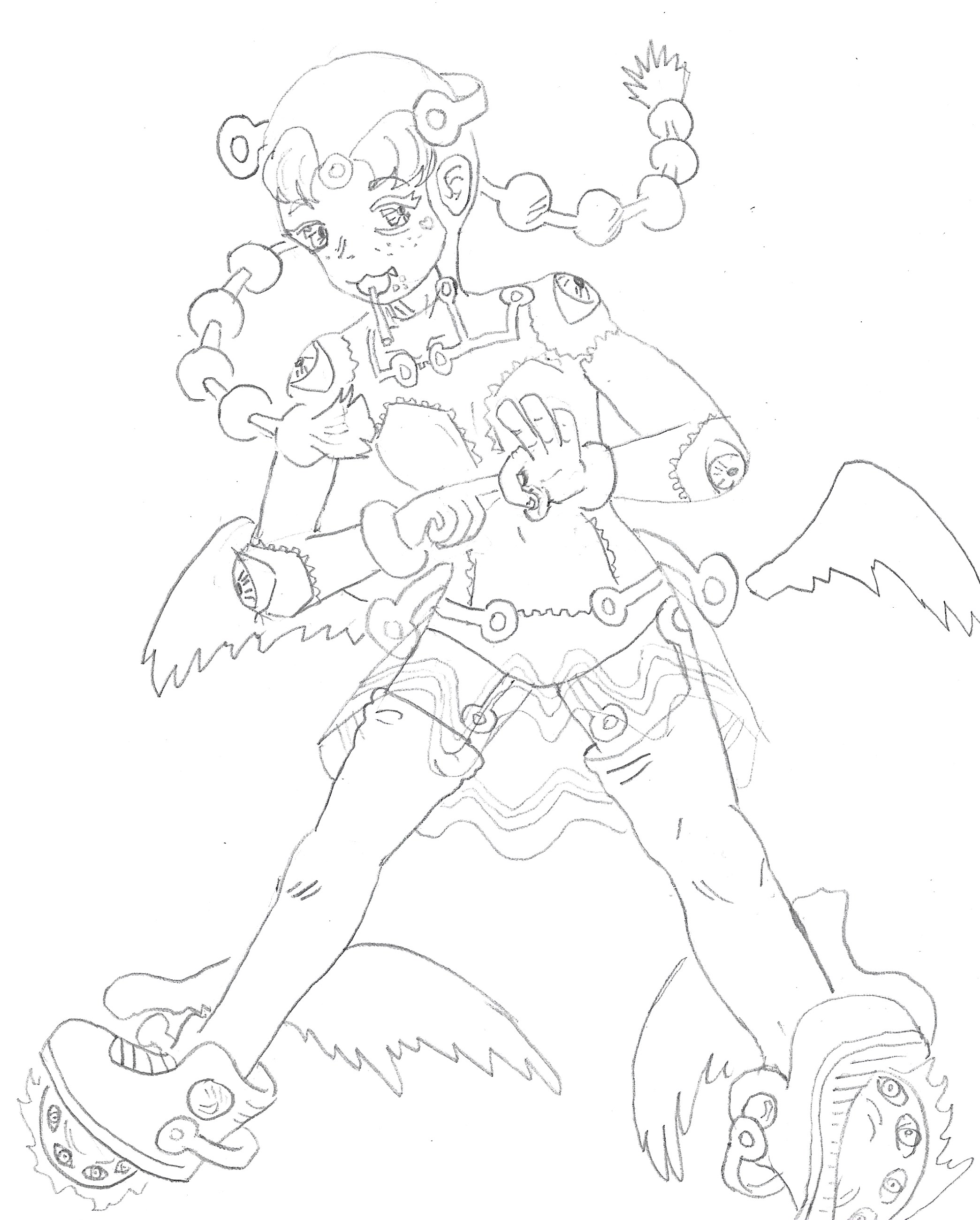
Smilia Miyoenra
Birthday: N/A
Sex: female (by calling)
Blood type: N/A
Likes: angelic artificial materials, cake pops, long pillows, exposition with plastic models, funny faces, conflict resolution, body heat, people who won’t accept help (in a cool way)
Dislikes: torture, people who won’t accept help (in an uncool way), walking, organic food textures, storms, succu-devils
Seen with: Astig Tsuzan, Azamiel Kelvoth
Theme song: Nanahira & Reol - Electric Angel
Legacy doctrines - beliefs no longer considered canon or orthodox by the Ecclesia, but not considered heretical either, such as angels and demons and heaven and hell and heavenly archons, formerly accepted for long enough to work their way into custom and cultural memory - have proved an inexhaustible resource for pop culture, particularly the deliberately degraded branch of it known by the Silmenon neologism “otaku”. Few have exploited (and reshaped) this resource as systematically as Shunny Najda.
When she first appeared in Hell Harrowing there was a small moral panic over the “succu-angel” Smilia - such a thing would have been considered flatly heretical when angels were an official belief, so it couldn’t rightfully claim the protection of a legacy doctrine, conservatives argued. Shunny Najda, unfazed, would respond to the controversy in the text of Hell Harrowing itself, first with winking one-liners, then with genuine pathos in an arc where her own existence is debated by a heavenly tribunal that many queer viewers would later claim as inspirational. The legacy of Smilia Miyoenra is, however, like much of Hell Harrowing, hotly debated in the fandom. She is the second girl who falls on the misanthropic Astig from the sky; she is sent from heaven to assuage his loneliness, which is distorting the labyrinth at the first level of hell around both him and Azamiel, at a point where neither of them are ready to admit their feelings for each other. Philosophically the concept of an angel whose function is attached to a need so individual as lust or even emotional intimacy is problematic for much the same reason as it would have been heretical when angels were actually believed in. Najda navigated this deftly enough through the series to justify her presence on grounds of artistic merit in the first circuit of the International Poets’ Court (setting the precedent for a wave of imitations nowhere near as sophisticated). On one hand, Smilia’s erotic role is her own choice, but within the theoretical bounds of her domain as an angel of emotional growth. It is, simultaneously, the product of society’s failures: her adoption of succubus technologies and techniques was permitted under the aegis of an experimental angel division that was shuttered and covered up after their function was abused by their superiors. In the penultimate episode, she threatens heaven with an appeal to the highest Goddess reminiscent of the text of Pistis Eurynomoea.
Yet she is the representative of a form of love Astig must eventually outgrow - indeed, she understands it as her function, though she never fulfills that in the way she hoped either - and that she is the Dark Lord’s “waifu” is, according to our psychologists (General Martolod himself was present for the writing of a few episodes of Hell Harrowing), a good sign that he is as regressed as we need him to be. But it is also a worrying sign of stubbornness. Her “embarrassing purity” is the most entertainingly written in the genre - genuinely human and novel at every occurrence, as well as formally baroque in the lengths to which Najda’s writing will got to make theoretical erotic knowledge clash with practical erotic knowledge clash with genuine erotic interest in a way that twists around three or four times in an interaction. She is also the organizing case study of an acclaimed psychological textbook on sensory sensitivities and the rubber fetish.
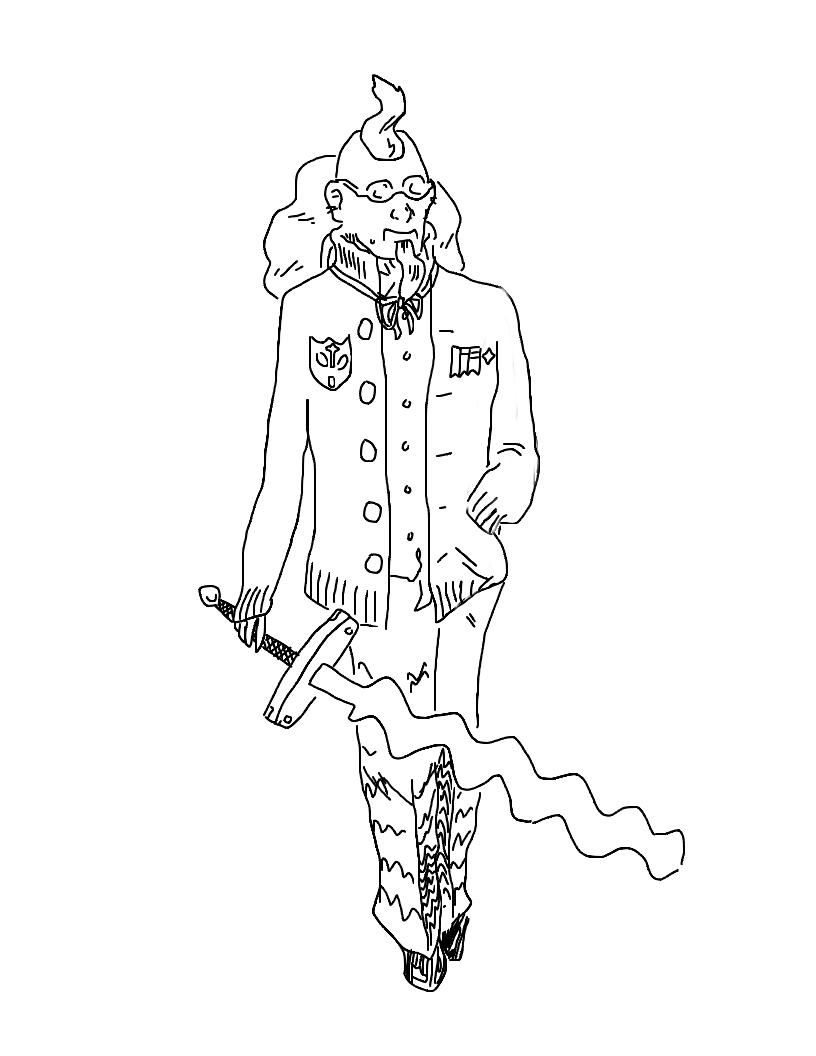
IOLAW MARK’EG
Blood type: C
Likes: Sweet coffees and/or hot chocolates, memory games, peer-reviewed journals, medical mystery (popular and avant-garde), gift-giving, the mission of humanity
Dislikes: Icy walks, quirky glasses, hallucinogenics, the smell of hospitals, badly designed magic, Traditional Orthodoxy
Seen with: Colonel Inquisitor Dahellan
Theme song: Goatbed - Neuromancer
An ambitious medical student from an ennobled brewing family - Mark’eg Mead&More is still a staple of C’harnian grocery shelves - marginalized by the nationalization of industry in Elthazan, Iolaw jumped from a surgical stream to psychology due to (according to his own interviews) its conceptual flexibility and dialogic spontaneity, despite lacking no proficiency in the domains of science based on physical/spatial intelligence and memorization, and a discomfort with the body that had been brewing as he came to understand more and more of it. There, while writing his thesis on the Psychodynamic Structure of Tragedy, his natural talents of observation and manipulation were detected by the Orthodox International Military Inquisition. The Inquisition in general is the Ecclesia’s version of an Intelligence Agency - and it has been using for several centuries longer than any of the Seven Nations’ Intelligence Agencies, which date primarily back to the Second Dark War. The Orthodox International Military Inquisition is the equivalent of an international intelligence agency - theoretically equally beholden to the governments of each nation and the Ecclesia, occupying the positions of stakeholders in a complex Maullanian governing algorithm that allotted services and governing directives through a system of esoteric tokens. In practice this unstable power sharing arrangement makes it dangerously independent.
He led several innovative campaigns psychologically profiling and identifying shape-shifters before getting Top Clearance and being assigned to the Dark Lord operation - a massive jump from his on-paper rank of Major Doctor Inquisitor. At the front, he has the same reputation as Rraihha Braz as a hypersincere idealist - one who joined the Inquisition because its ideology gave him direction when he was initiated. At heart, he remains a curious, bored man, although one who feels bothered by an itch for direction. Before joining he had no strong theological views, but on discovering Inquisitional Orthodoxy discovered they were the final piece of his puzzle; his family reputation alone had not mattered enough to him to direct his energies. He struggles with being genuinely cruel to patients, and always tries to give them the softest landing possible into whatever position he puts them in. On occasions, though, he is also occasionally called on by its newly established behaviourist element to use his physical medical expertise, finding in it an almost mystical resolution to his own physical anxieties. Since its conclusion he has been living the quiet retirement often afforded to Dark Lord veterans, too compromised to be involved in anything important, but also in the loop of everything important, an anonymous minor grey eminence. He reads mystery novels and is a disciple of Yukhil Tsÿo.
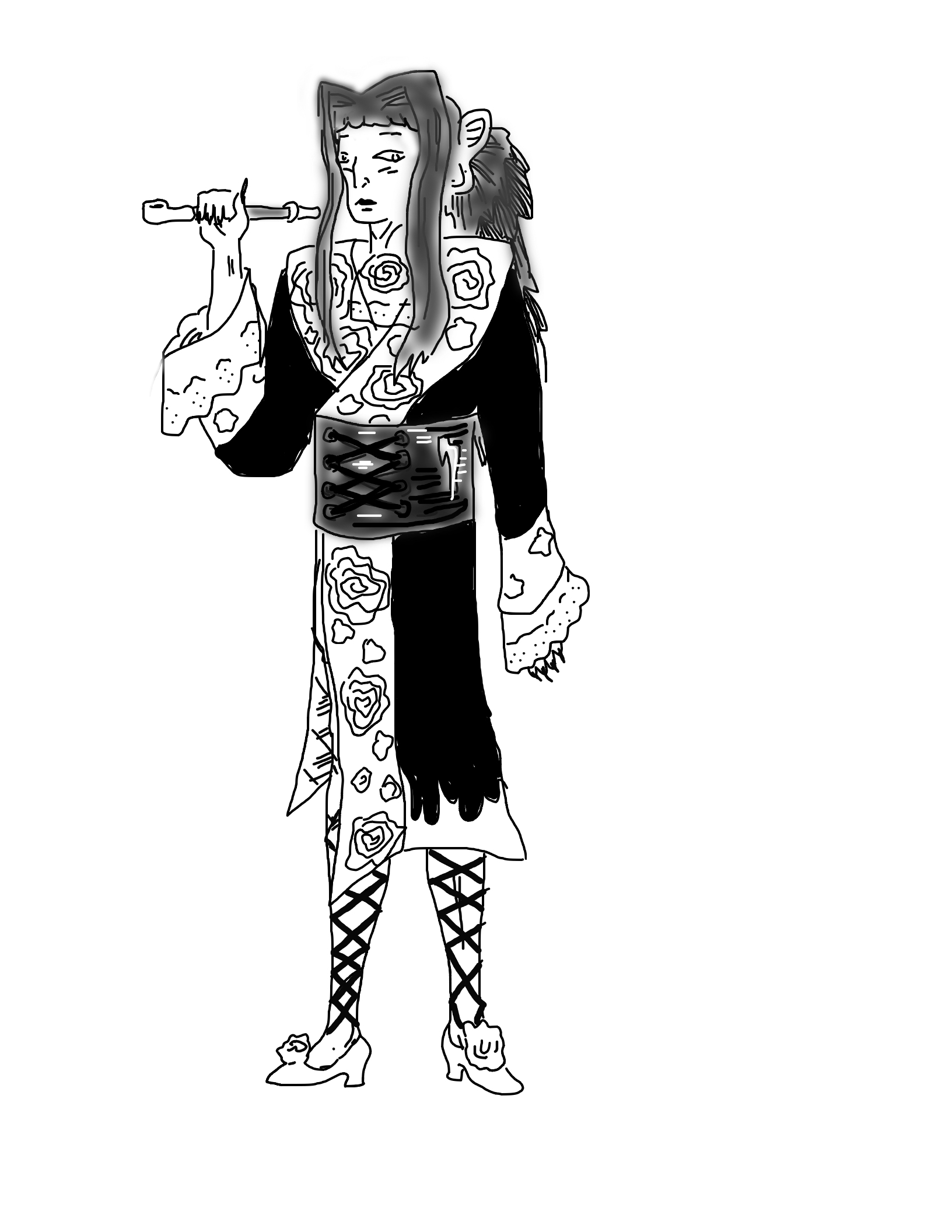
SILMENON SANGRIOT
Likes: roses, woodblock prints, textiles, shisha, impermanence, cherry blossoms, flirting via poetry, secrets
Dislikes: dogma, loveless marriage, extreme climates, heavy meals
blood type: O -
seen with: the Seven Heroes
Theme song: Schwardix Marvally - Flowers of Dearly
Before the centralization of the Ecclesia, mages and clerics were not always strictly differentiated outside of the context of an adventuring party. Both used magic, and both understood their magic in an at least partly theological sense. Though clerics tended to be more theologically orthodox and mages more esoteric, the difference essentially revolved around role in a party: clerics were focused on healing, support and luck/preparation. Mages, on the other hand, used magic for combat, intrigue and solving unanticipated problems. This entailed a very different style of usage - where clerics mostly memorized spells, rituals and prayers, mages had to be able to improvise them on the spot. The “technological” magic of the modern world is a combination of clerical magic and magecraft - generally mages “discover” the spells, and clerics codify them to be usable by masses of magically uneducated employees. By the time of the Seven Heroes, mages and clerics had already started to specialize and develop their historical rivalry, though most magic users were still expected to learn both mage and cleric skills to use as a party or locality needed them.
The flamboyant mage Silmenon Sangriot was perhaps the most idiosyncratic and volatile member of the Seven Heroes’ party - and later the most isolated, justly or unjustly, from the construction of political institutions after the defeat of the Dark Lord. He identified as male but often wore women’s clothing and elaborate makeup and hairstyles, habits he acquired before becoming an adventurer as the travelling magician of a theatre troupe. Silmenon’s troupe was, infamously, devoured by its own audience in a village overrun by shapeshifters, and he identified immediately with Yahsef Kamann’s mission of vengeance. However, his vengefulness was tempered by curiosity; more than any of the other heroes, he wanted to understand what the Dark was and why it periodically rose against civilization. Most of the best early primary sources on the Dark Realms and Dark Magic come from his writings. However, despite conspiracy theories and heresies to the contrary, he never came close to the knowledge he most desired - what exactly the Dark Lord was. Some historians have suspected him of wanting to become the Dark Lord himself; others theorize that the Cleric Maullan, fearing this possibility, hid or destroyed information that would have allowed him to solve the enigma once and for all. Yet Silmenon, like the Ranger Elthazan, was broadly uninterested in power or the shape of the future world order - though he eagerly accepted his title as king ceremonially while deferring most political responsibility to an intricate web of local nobility and democratic councils.
His most controversial act was his split with Maullan over the unification of the Ecclesia, even refusing to grant her Ecclesiastic authority in his kingdom. This led to his being cut out of the founding of the postwar magecraft institutions, and it was only hundreds of years later with the completion of the Sevenfold Alliance at the end of the Warring Era that enough of his magical innovations were accepted into orthodoxy to make the technological revolutions of the postwar world possible. The Church of Silmenon was granted some autonomy under the Ecclesia in exchange for allowing the Mages’ Colleges to study his grimoires, and it is unclear which of its idiosyncrasies actually derive from his personal beliefs and which from the menagerie of heretics that sought refuge in his kingdom, though the infamous Carnal Communion was common in circuses and Silmenon likely practiced it himself. The development of modern scientific magic can be traced to the reconstruction of Silmenon magecraft under the pragmatism of Kamann’s military administration and the Ecclesia’s formalizing rigor. Having learned in the unprofessional environment of the theatre, he was a prolific inventor of spells and considered one of the greatest improvisational magic users of all time; magic theorists have lamented that it may not even be possible to improvise at his level any more with so much of magic systematized and charted. Silmenon never wrote down his own theology, which may have been as improvised as his magic.
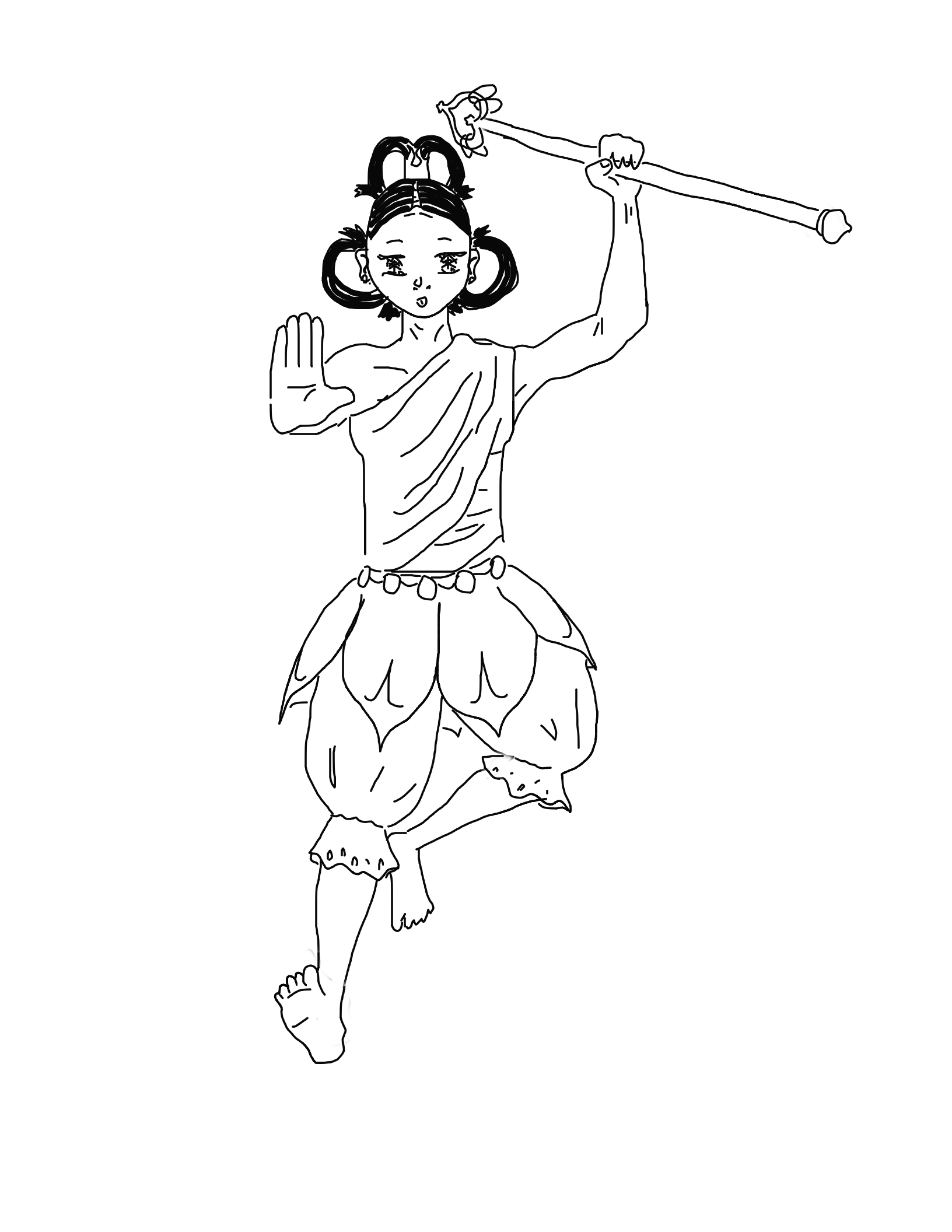
JIADDIEU MIWA
Likes: dates, festivals, alcohol, rock climbing, campfire singing, fresh water, victory, lemurs, girl sweat
Dislikes: ranged weapons, organizational politics, hard floors, vows of chastity, torchlight, overthinking
Seen with: Seven Heroes, Netrix Klauxion
Blood type: A
Theme song: Leftmuenang - ศพสองท่อน (Instrumental)
While Mages and Clerics are a doctrinal division of the mainstream practice of magic that did not exist in its current form before the Seven Heroes, the two other magic-using classes, Monks and Druids, are much rarer and derived from extremely specialized, regional religious traditions. Several generations before their most celebrated acolyte (to the point of her name becoming synonymous with the entire school) brought their practices to the world, the Temple of the Double Moon was founded as an all-female order dedicated to embodying the image of the dancing Goddess by cultivating their bodies with internal magic and disciplined, elegant movements borrowed from the barehanded fighting arts. While the existence of Rhi had long been understood roughly as part of the equation of magic (and some forms of physical combat), the Temple Mothers and Hermits innovated the foundations of the modern concept of Rhi fields, and demonstrated their understanding by enhancing their physical abilities, as well as healing and longevity, to sometimes superhuman levels. The Double Moon was itself only one of a profusion of monastic orders that had flourished for complex cultural reasons in the Shieuddua Estuary, most of which were purely religious in nature, practicing vows of poverty among other asceticisms, but some of which especially after the ascension of the Double Moon became outright luxurious and infamous for enhancing the beauty of their bodies in action with clothes and makeup. These “idol-monks” were the source of the fascination with magical girls and beautiful fighting girls in Silmenon’s animation.
Most sects and their members were too preoccupied with their internal cultivation to join a quest to the Dark Realm. Jiaeddiu, however, had never been devoted to her studies for their own sake. The eighth daughter of her family, she was handed off to the less renowned Streaming Turtle’s Back Temple as a child. Naturally talented in the physical arts, she set about restoring the Temple’s reputation and finances by participating in local fighting tournaments and taking on more missions until she was “traded” to the Double Moon itself. Eventually becoming the Seven Heroes’ strongest combat asset, in the final battle she famously held her own against the Dark Lord alone for ten whole minutes while the other heroes had been incapacitated. Despite her skill she often struggled with the deeper internal practices, and would come to understand many of the Temple’s spiritual texts in her own way over the course of her adventures - and her romantic relationship with the Rogue Naetrix Klauxion. Less interested in religious reform (or esoteric research) than Maullan and Silmenon, she let most of the monasteries carry on their own traditions and only wrote a few introductory texts of her own at Maullan’s behest. Due to her cultivation, she outlived the love of her life by 150 years, and retreating from the worldly requirements of the Orders became a mountain hermit for almost a century, drinking heavily and accumulating a massive harem of women who took on most of the actual duties of government, and after her death formed their own monastery, Eroding Peak. This also made her the only one of the Seven Heroes to live to see the Dark Lord’s next reincarnation, though they never fought directly again.
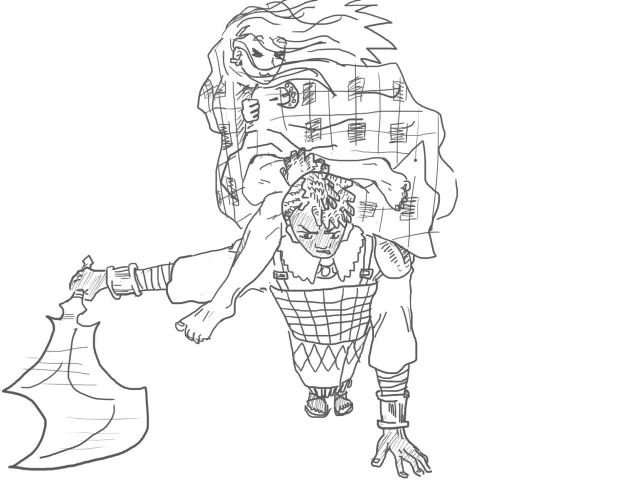
KAMANN YAHSEF /ELTHAZAN
Likes: steamed fish, humble rulers, reunions, impartial justice, hand-knit cloaks, brandy, pomegranate red, cold baths
Likes: clear moonlight, glaciers, rowan berries, observing (and eating) new species, wrestling with Kamann, practical jokes, body ornamentation, honeysuckle nectar, palace roofs
Dislikes: greed, glory seeking, showy swordsmanship, guild bureaucracy, shapeshifters, untended land, swamps, lewd camp songs, serf labour
Dislikes: monotonous architecture, gender expectations, unloving parents, undead, stuffy clothes, dust
Blood type: A
Blood type: B
Theme song: Galneryus - Fighting Of Eternity
Theme song: Elvenking - Petalstorm
A disinherited knight whose family was massacred in a Dark attack, which many suspect to have been permitted by the regional Dux Bellorum, and subsequently blamed for the region’s devastation by Dark forces and stripped of its title. Kamann was driven in equal parts by a furious lust for vengeance - against both the Dark and the corrupt human authorities enabled by its omnipresent threat - and a deep longing for justice, for the trust and honour that had been denied his family, for the peace that had been torn from his land, for no one ever again to suffer like himself or the people around him, the peasants who raised him in disguise and sent him out into the world as a mercenary adventurer. Both of these traits made him an inexhaustible, single-minded, obsessive worker, one of the few Fighters of his era to think of it as a science as much as an art, eventually equalling the capacities of a Monk of the Mist-Cutting Moon with mere physical training. If not the leader in a strict hierarchical sense of the Seven Heroes, he was the emotional glue of the party and the one who persuaded them to take on their riskiest and most impossible tasks, to never back down where other parties might have settled into a peaceful equilibrium before doing the impossible and defeating the Dark Lord. He wielded the huge magically enhanced claymore Firebrush, which absorbed opponents’ kinetic energy and transferred it to his sword arm among other abilities, and supposedly in the Dark realm, once he had learned to wield Firebrush one-handed, stole the Dark Sword Gargon from one of the Dark Lord’s Twelve Hands, with its fearsome power to strike backwards in time.
After the defeat of the Dark Lord, Kamann took the responsibility of managing what was recaptured of the Dark Realms. The borders of this territory would shift back and forth constantly over the course of the Warring Era, even today a much smaller “Dark Realm” remains within its borders (where ecological alterations were so extreme as to be virtually uninhabitable to humans and many animals, but stable for otherwise invasive Dark creatures). The country he built there was conceived of as a sanctuary first for the many refugee populations from the Dark wars, as a military bulwark against any possible Dark resurgence, and an experiment in good government and justice as an example to a world set in its ways. Kamann has a hereditary monarchy, the Yahsef line - the only direct Heroic dynasty that retains power in its country today - but no aristocracy, with a powerful meritocratic military and a complex regional democratic magistracy (combining judicial and some legislative powers) as the main pillars of its government. It is divided both into geographic provinces, determined on strategic principles by the military, and non-geographical ethnic sub-polities reflecting its incredibly diverse makeup.
His catchphrase is “when someone calls out to the Goddess for aid, I want to be the one who answers.”
Elthazan appeared as an orphan in the North of the country that now bears their name, remembering nothing about their parents except that they had said they were journeying far South to the Dark Border. Why this meant leaving their child to fend for themself at no older than six to eight is unclear. In any case, Elthazan followed their parents’ last words all the way from the Northernmost point of the continent to the Dark Border in the far South, with nothing to identify them but a strange feather they wore around their neck. They might have become a rogue on this journey but due to their strange mannerisms rarely stayed long in human settlements and preferred travelling through the wilds - they were referred to by contemporaries as a wodwo insofar as they lived wild and without the benefits of agriculture in the woods, though it is not clear if they belonged ethnically to the hunter-gatherer peoples now known pejoratively as “wodwos” (their northern origin however makes it likely). Elthazan quickly discovered there was a demand among the settled peoples for Rangering, and despite the legend of his nude solo encounter with Yahsef Kamann - which first appeared in C’harnian romance before its endless elaborations by Heroes’ Love authors and conflation with certain lines in his surviving poetry - likely alternated between travelling alone and working with adventuring parties, at least learning the bow, the atlatl and sophisticated traps before taking up with a small party consisting at the time of the fighter Kamann Yahsef, the cleric Yyama’a Maullan and the rogue Netrix Klauxion. They did, however, become Kamann’s closest friend and likely sexual partner, going by allusions in both of their writings. In the end they never found their parents, though the feather they were gifted came from another one of the Dark Lord’s twelve hands, which would make them among the most accomplished adventurers of their era. The question continues to puzzle historians, as none of the known adventurers who could have made it that far fit the circumstantial details.
Elthazan is the only Hero who did not name or govern their country as they did not know if it was truly their home, leaving it to the existing C’harn aristocracy - though the Ecclesia eventually pressured C’harn to adopt the standardized name as part of the Sevenfold Alliance. The Northern kingdoms in which the ranger appeared were, next to the warring chaos of the Dark borderlands, among the least unified; but Elthazan did not have the character to unify them. Instead, they were quickly persuaded into an alliance by ritual mating at a midwinter revel with one of the most powerful royal families - that of C’harn - which gained under the Sevenfold Pact legitimate title to the entire region. Though C’harn quickly pacified its already less powerful neighbours, who alleged that the mating had been coerced, the C’harn aristocracy was itself composed of dozens of distantly related branch families, among which the line of Elthazan was soon diluted and contested. (Rraihha Braz may even possess some of this bloodline; all but the most obsessive monarchist revanchist scholars have more or less given up on keeping track.) After several bouts of civil war, C’harn would eventually accede to mediation by the Ecclesia and the Alliance, and royal sovereignty would be replaced by a complex modern system that combines high levels of local autonomy and direct democracy with a centralized military/executive overseen by the Alliance and the Ecclesia, with public elections of key positions between approved candidates. This reorganization was sealed by the final recognition of the territory’s name as “Elthazan”, and is still regarded by closely monitored elements of both the aristocracy and the public as a national humiliation, though also sometimes considered a victory or vindication for Elthazan’s minority cultures and ethnicities. Elthazan can be loosely divided into four main regions; the Eastern coast, a thriving commercial region close to Klauxion; the southern mountains and West coast, home to several distinct semi-nomadic cultures; the interior taiga, home to Winter City and the rural heartland; and the Northern tundra and glaciers, whose cultures are still reclusive and poorly understood. C’harn proper was, historically, the culture of the East coast and interior.
It is still unclear what language the name “Elthazan” even comes from, or if it was merely a “stage name” they adopted as a Ranger. Elthazan did nonetheless return to C’harn, and according to officially suppressed folktales even became a thorn in the side of the C’harn rulers themselves, living in the woods, stealing from the rich and giving to the poor. Fifty to a hundred songs can be credibly traced to them, mostly in short lyric forms with mnemonic structures, dealing with aging, endearing animal and human behaviours, and natural features mostly surrounding the Camluz keep.
reincarnation, though they never fought directly again.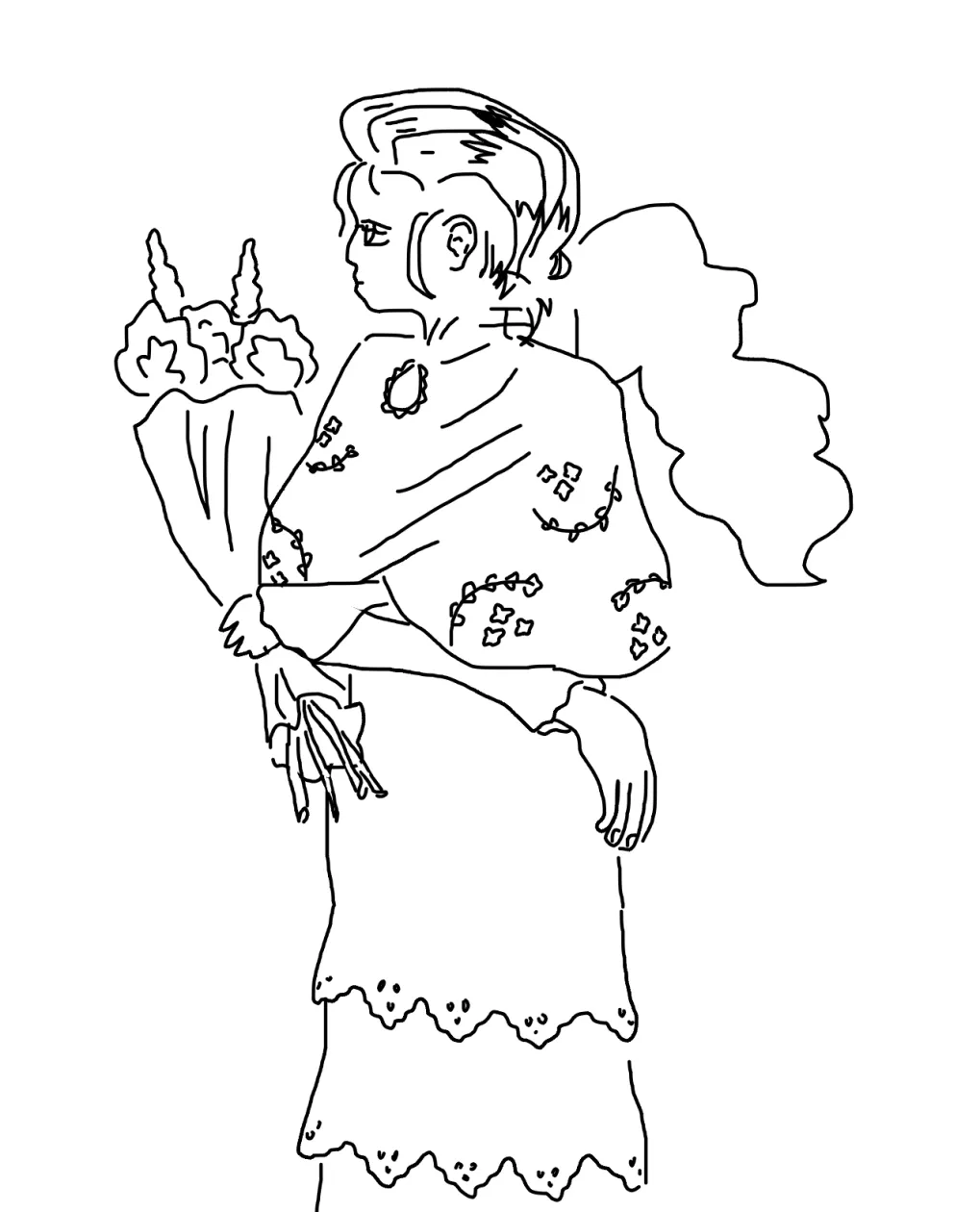
GALLVREN DEN’KERRIG
Likes: Reading in places where no one knows her, light scarves, layering, lilac, watching bees, Kamann anatomical sculpture (hands), Blossoming Age Heroes’ Love, researching historical men’s homosexual practices, perfume in a sauna, rutting systems
Dislikes: untended city greenery, deep cleaning, library fees, music while working, commercial HL, festival costume-based designs, comedies, traumatic insemination systems
Blood type: A
Birthday: May 7
Theme song: Emma Frank Quartet - Age of Doubt
Gallvren Den’Kerrig has shared only three fanfics on Gwerz, the state-funded platform funded by the Patriotic Spinsters’ Union dedicated not exclusively to Heroes’ Love but to a more general category of “Comfort Fiction”, albeit within the intensely subjective and cultural standards of its reader voting system and hundreds-strong volunteer censor team which keeps out much of the Silmenon-style otaku content, out of hundreds a remark in her confession records suggests she has stored away. These are out of reach even to us, which has raised some concerns about the predictability of her impact, but the three she considered good enough to publish should give us a good picture of her aesthetics and interests. Her core ship is Kamann/Elthazan, although her personal favourite is a 5,000-word Silmenon/Elthazan experiment she wrote for a prompt challenge. She is deeply concerned with historical accuracy, taking out recent academic works from the public library on an almost weekly basis, and with specific elements changed between her first and last published work (both Kamann/Elthazan fics) based on more recent research. She does, however, try to include more legendary elements wherever possible, such as the guidance of the Blue Albatross in the battle with the First Hand. Elthazan and Silmenon’s early travels in the North, where the natural landscape is almost a third partner in their dynamic, is her favourite subject since childhood.
She has a loose group of four Heroes’ Love friends she knows from the Public Library (their friendship is recorded on Domesday, but does not appear to be conducted much online) which she carefully compartmentalizes from the rest of her life. Despite its small size, this group is not especially close. Nor is Heroes’ Love actually that stigmatized in her social milieu (mostly lower C’harn guild families and Alliance Exchange guest contributors; she did a two-year Guild Certificate in Ornamental Ecology and was put straight into a storefront). Her reticence about her interests is a bit old-fashioned in itself. (Imagine the sort of otaku who, in Silmenon, still uses the word in its honorific sense.) She is up-to-date with mainstream culture to a degree exactly sufficient to maintain casual conversation, and volunteers with neighbourhood childcare and seasonal entertainments, where memory wiped interview subjects described her as focused on her physical surroundings. Her relationship with her family is good enough to inspire little rebellion, although intrusive enough that she has learned a habit of sometimes impenetrable distance. Bisexual with a slight male inclination, she starts GL fics with about the same frequency as her BL ones but abandons them quicker, and straight ones rarely but with dogged intensity. She has a very strange and personal repertoire of songs she can sing from memory. She has been propositioned by a few men who have been very polite but underwhelming compared to their fictional counterparts.
Den’Kerrig may not grasp the full distance between herself and someone like Luskonneg - putting her in a natural position to humiliate him even without our prodding as soon as she does. Meanwhile this same type is ideal for producing an emotional investment in him - simultaneously “normie” enough to desire and envy, and hiding a secret vein of connection. This mechanism has already been primed by his media diet, and none of his confessional or digital output suggests he has perceived the pattern except in a paranoid form.

GWAELLE FINSTERYON
LIKES: thrift shopping, photographs/paintings/drawings of rooms, the feeling of dreams after you’ve forgotten their details, waiting for the bus, C’harnian mouth harp, group hugs, greeting cards, tearful apologies
DISLIKES: people assuming her own best interests, discipline/empathy tradeoffs, gaudy fashion, eating meat (including magically grown), television, theatre games, work/life imbalance, things she already knows
BLOOD TYPE: A
SEEN WITH: Public Morals Committee, Knitting Club
THEME SONG: Aiko - Straw (?)
A more thorough study of the unusual circumstances around Holygrove High, with access to more sensitive documentation than our admittedly volatile subject has been permitted, would also note the density of unusual transfers both out and in during the years Luskonneg attended. While we could not afford to over-optimize (as this would destabilize results in its own right), students were psychologically screened across its normal incoming class, both for resilience to unusual occurrences and ability to accept peer cruelty. (The contract functioned as a screening mechanism of its own.) Where . Gwaëlle Finsteryon performed exceptionally in the first bracket, and underperformed in the second - within a statistical window identified by the psychological team as a valuable asset in its own right. She was transferred in - and, unlike any other in-transfer student, pre-emptively *obfuscated the contract from her own parents to prevent them from preventing her from signing it*.
Gwaëlle was being flagged by teachers as a valuable classroom mediator as early as first grade. She was almost tracked into the Public Morals Committee, given special Scripture instructions by a school cleric from grades 3 to 6, as well as fast-tracked a therapist for the burdens she seemed likely to shoulder. Ylian referred to her in private interviews as a “natural”, and suggested that were it not for relatively low organizational acumen, she could have easily taken the first seat, but preferred the second so she could make time and mental space for a normal life for herself. This preference, which seems to have been genuinely her own, was also, however, in tension with her almost compulsive tendency to go above and beyond her duties in helping extreme cases. In fourth grade she was almost singlehandedly responsible for preventing one of her classmates from falling a year behind in math. Gwaëlle describes the relation in terms of a kind of stubbornness: on her application she listed both her strongest motivation and greatest liability as “frustration” that others would not follow the paths to Order she perceived as easy for herself. Thus she never conceived of herself as living for others, but living for herself and dragging others along with her. On the Tarot test she scored highest on the Beckoning Goddess. This was shared with her and balancing protocols worked out long before she came to the Containment Project’s attention.
Knitting and the knitting club was a balancing protocol. It was not, as Luskonneg imagined, a thread leading to the centre of her heart. Her interest in a number of adjacent arts - fashion, design, photography - suggested it as a simple hobby with a social dimension; she had neither exceptional talent in any of these domains nor the will and bandwidth to pursue them to their depths, at least until she graduated mandatory education. She had little interest in pursuing psychology, social work or any such role professionally: she knew her skillset would be an asset in any workplace, and had designated positions in most. Her friends were, at a slightly lower level of pressure, the same way - none were serious knitters, but they were real and very close friends. She kept the world of the Public Morals Committee compartmentalized from theirs; they respected and took pride in their friend’s prestigious position, and when she was exhausted or discouraged by it, understood their job as pulling her away, back into their world, to recover; if need be, to enforce her boundaries where they wouldn’t. Their friendship predated her, however; their club had been whittled down to its core membership in middle school, before Gwaëlle’s transfer. They also showed little interest in romance, sexuality or the opposite sex. Atràpy began dating a childhood friend who went to another school in 11th grade and, after the incident with Luskonneg, drifting away from the trio. (It was she from whom Marzanna was able to obtain the photograph of the drawing.) The Knitting Club was one of those adolescent spaces in which the security of childhood was maintained, rather than adulthood experimented with. And Gwaëlle was too compulsively self-aware to be unaware of the world of adulthood. Her confession records indicate a sexuality she experienced much the same way as Luskonneg - as intrusive. Sometimes it attached to the objects of her interventions. Shaïgnar and many others on the project considered her involvement an unacceptable risk, given its payoff would not even be knowable to the target. Mark’eg submitted the value of hidden Order, and of planning for the subject to know more than planned.
She was, at the height of her entanglement, activated as a fully directed asset, but was removed from the picture by unexpected circumstances before she could act as such. In college she shifted her major to Mysteries and retreated from involvement with others. The signs of a traumatic interest - often particularly dangerous in Mysteries - were made apparent to her professors, but the shift in social milieu was fortuitous in enabling her to meet others who appreciated the depth between the halves of her life she had previously separated, including a young man with an interest in poetry and a history of bar brawling. She is currently completing a dissertation on the analogies between magical and literary structure that promises potential real-world value in worksite magical training. She refuses all contact with the Inquisition.